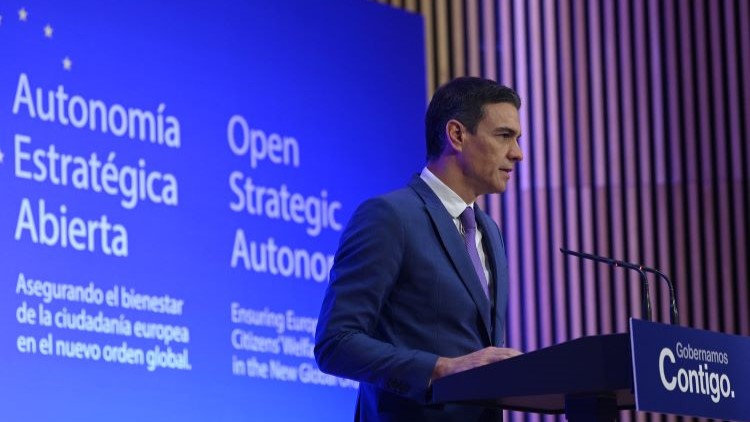The Diplomat
The President of the Government, Pedro Sánchez, announced yesterday in Madrid, before representatives of the 27 EU Member States and companies, the work plan of the next Spanish Presidency of the Council of the EU to promote “Open Strategic Autonomy”, which will be “one of the priorities” of the Spanish semester.
“The international order is changing and the EU must change with it, and we are going to do it,” warned Pedro Sánchez during his speech at the event Open Strategic Autonomy: Towards a new pillar of European welfare, organized by the National Office of Foresight and Strategy, at the headquarters of the Ministry of Foreign Affairs in Madrid.
“We must respond to this challenge and we must do so with forcefulness and confidence, knowing that, although we have serious vulnerabilities, we Europeans also occupy a geopolitical position of great strength”, continued the head of the Executive before the government representatives of the 27 European States and fifty companies present at the event, which was also attended by the Minister of Foreign Affairs, José Manuel Albares. For this reason, he warned, “international fragmentation would benefit no one” and the Member States must respond to the current challenges with “more integration, more multilateralism and greater international leadership”.
According to Sánchez, the advance of globalization, both in the exchange of goods and capital, has forced the EU to acquire “strategic dependencies” with third countries which, in recent years, have become “a severe risk for the welfare of citizens”. An example of this, he continued, are the effects that “international shocks such as the COVID pandemic or the Russian invasion of Ukraine” have had on the “proper functioning of the Single Market” and on “the supply chains of health material, semiconductors, energy and food, causing problems of shortages, a price crisis and social pain”. For this reason, he insisted, the EU must recover “strategic capabilities that it should never have lost”.
In these circumstances, he recalled, the institutions of the European Union and the Member States have launched several initiatives to respond to this problem following the framework of the so-called “Open Strategic Autonomy” suggested by the European Commission. Likewise, he assured, “promoting Open Strategic Autonomy will be one of the priorities of the Spanish Presidency of the EU” in order to support the creation of “a stronger and more resilient EU that can guarantee the prosperity and well-being of its citizens in the new global order”.
With these challenges ahead, he explained, the Spanish Presidency (which will take place in the second half of this year) will promote several initiatives. On the one hand, an intergovernmental research project will be promoted to analyze the main strategic vulnerabilities of the EU in four key areas (energy, food, health and digital technologies), as well as the most effective ways to address them and the effects that these measures could have on citizens and businesses. The project will involve 25 Member States and more than 50 Ministries, in collaboration with the Foresight Network of the European Commission’s Vice-Presidency for Inter-institutional Relations and Foresight and with the support of the Council of the EU.
In addition, the Spanish Presidency will organize in October 2023, in Granada, an informal meeting of the European Council in which the Heads of State or Government of the 27 Member States will discuss the future of Open Strategic Self-Government and other strategic priorities of the EU. In addition, working meetings and high-level forums will be held throughout the year to discuss the European strategic agenda, involving senior public officials, business leaders from around the world, academics, trade unionists and representatives of civil society. These activities will be led by the Spanish Government’s National Foresight and Strategy Office, which will work in collaboration with the Coordination Office for the Spanish Presidency of the European Union, the Member States, the General Secretariat of the Council of the EU and the European Commission.






